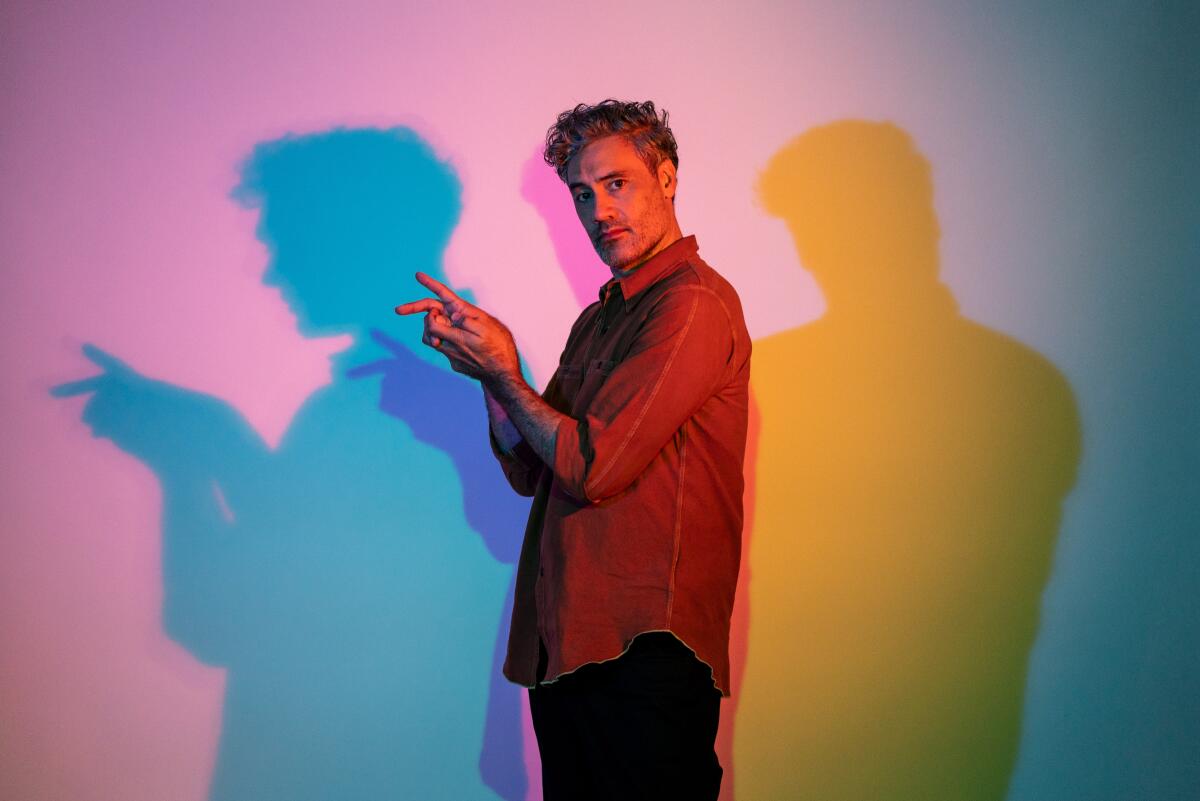‘Jojo Rabbit’s’ Taika Waititi prefers the truth to the facts

- Share via
Taika Waititi is soft-spoken and polite as he closes the blinds in this Four Seasons suite, takes off his shoes to reveal brightly colored socks and stretches out on his side along the couch. The asymmetrically coiffed director of the Oscar-contending Nazi comedy (yes, Nazi comedy) “Jojo Rabbit” may come off as a mad artist, but at least he’s a nice one. And comfortable.
“I’m turning a sports documentary into a film at the end of the year [both are titled ‘Next Goal Wins’]. Sometimes the fear is, ‘It shouldn’t veer too much from the documentary; it’s a true story,’” says one of New Zealand’s favorite sons.
“If you want the real events, watch the documentary,” he adds. “I’m not in the business of telling the truth. There’s that great saying, ‘Don’t let the truth get in the way of a good story.’ Because otherwise, films would just be boring.”
He laughs and amends that to allow it’s a recitation of facts he’s not interested in, while keeping his sights on “truth.”
“But it’s a human truth. The details and facts are beside the point. A human experience, trying to change someone emotionally or affect them emotionally, that’s the truth that you’re seeking.
“So with the book, I didn’t feel guilty at all, changing stuff,” he says, though giggling, “because I have to make it interesting for myself. I have to want to watch the movie.”
The book in question is Christine Leunens’ “Caging Skies,” the basis of “Jojo Rabbit.” He describes the novel as “quite dark”: the story of an enthusiastic Hitler Youth discovering a Jewish girl hidden in his home.

In “Jojo Rabbit,” director Taika Waititi brings to life a World War II satire that follows a lonely German boy whose world view is turned upside down when he discovers his single mother is hiding a young Jewish girl in their attic.
“For me to stay interested in doing it, I had to keep it in my wheelhouse, my sensibilities — add humor and lightness and weave in and out of the dramatic story. I don’t particularly care about telling a story about Nazis. I wanted to look at war through the lens of children.”
So the iconoclastic filmmaker, whose offbeat, humanistic narratives include all-time New Zealand box-office champs (“Boy” and “Hunt for the Wilderpeople”), the vampires-as-schmoes mockumentary “What We Do in the Shadows” and one of the craziest MCU entries, “Thor: Ragnarok,” put his indelible stamp on “Jojo Rabbit.”
Starring newcomer Roman Griffin Davis alongside Thomasin McKenzie, Scarlett Johansson and Sam Rockwell, the film prances along a line of absurdity not usually associated with World War II films, with cheekily anachronistic language and musical choices. It won the People’s Choice Award at the Toronto International Film Festival.
“Rabbit” retains Leunens’ anti-hate, anti-war themes. Alterations from the book include his decidedly more comic bent and removing the boy’s father from the picture. But the father’s absence creates an emotional vacuum, which Waititi filled in with the boy’s supportive — though petulant and petty — imaginary friend: Adolf Hitler, played by the director himself.
In a separate interview, author Leunens said she thought the change was a “very sharp choice. Hitler really did present himself as a father figure, as did other dictators, so I thought that was a brilliant move.”
She enthusiastically embraced Waititi’s unique spin throughout.

“A lot of films I’ve seen of books I’ve loved, I found when they transferred from book to film they became a bit boring. So I thought it was really important he put in his own love and vibrancy and all the different colors he brings to it.
“It’s very important that something of the film remains with me long afterward, in my memory. I’ve found that all of Taika’s films, I could almost go back now without having seen them again, and I could [describe] scene after scene because the visuals are so powerful. Like a powerful dream you’re not able to forget. In the most positive sense, it’s been ‘Taikalized.’ Beneath the laughs, you have poignancy. It has notes of joy and hope,” she said.
Even with those noble intentions and the increasing current relevance (acknowledged sadly by Waititi and Leunens) of a story of a child shaking off authoritarian indoctrination, the film has received a fair amount of backlash — including from people who haven’t seen it — that Hitler could ever be a comic figure.
“It irks me that they think somehow I’m trying to …,” says Waititi, his voice becoming more villainous, “become some shock filmmaker, the ‘Bad Boy of Cinema!’ Trying to ‘shake things up’ by putting jokes in a World War II movie.
“It’s ludicrous because we’ve been doing this for” decades, he says, referencing Charlie Chaplin’s “The Great Dictator,” among others. “Or to say that ‘Comedy is dead; there’s no room for comedy now.’ Comedy is at its most sophisticated right now. It evolves all the time. It’s alive.
“You think ‘Fleabag’ would have survived in the early ’80s, with shows like ‘Benson’? [‘Fleabag’] is such a work of art and genius, that you can have comedy with tragedy and heartbreak and be laughing while you’re crying ... which is why I make my stuff as well.”
More to Read
Only good movies
Get the Indie Focus newsletter, Mark Olsen's weekly guide to the world of cinema.
You may occasionally receive promotional content from the Los Angeles Times.











